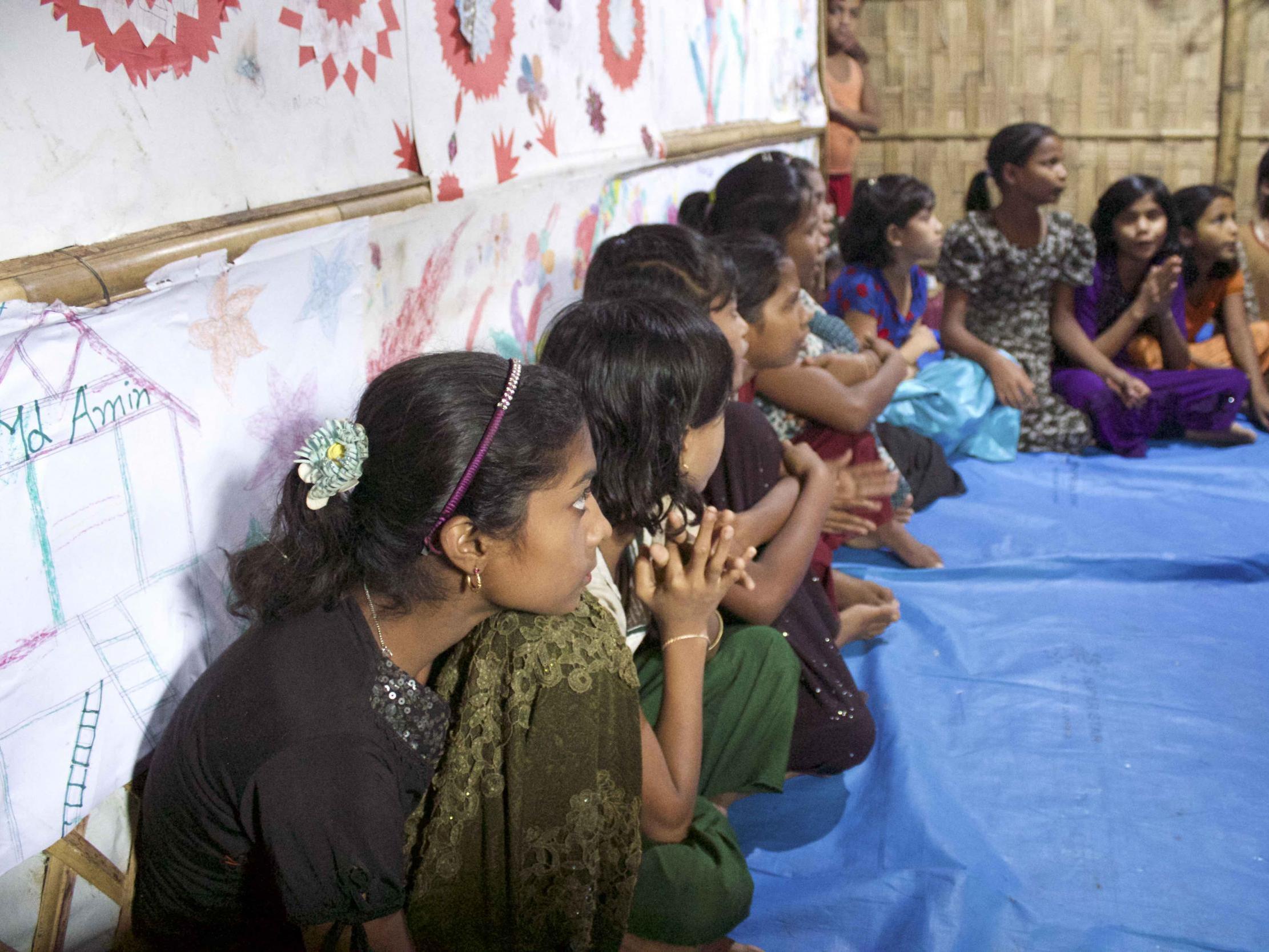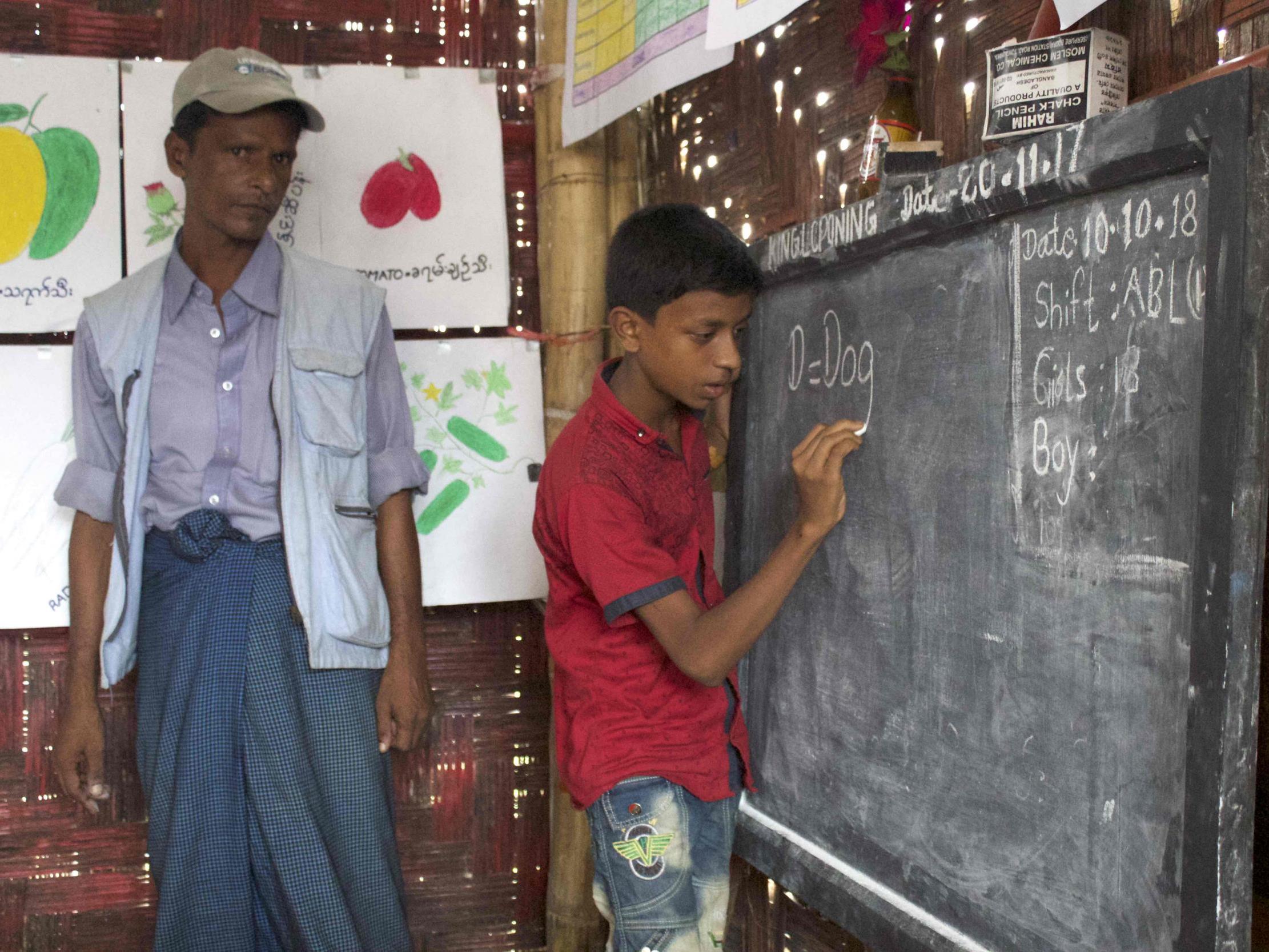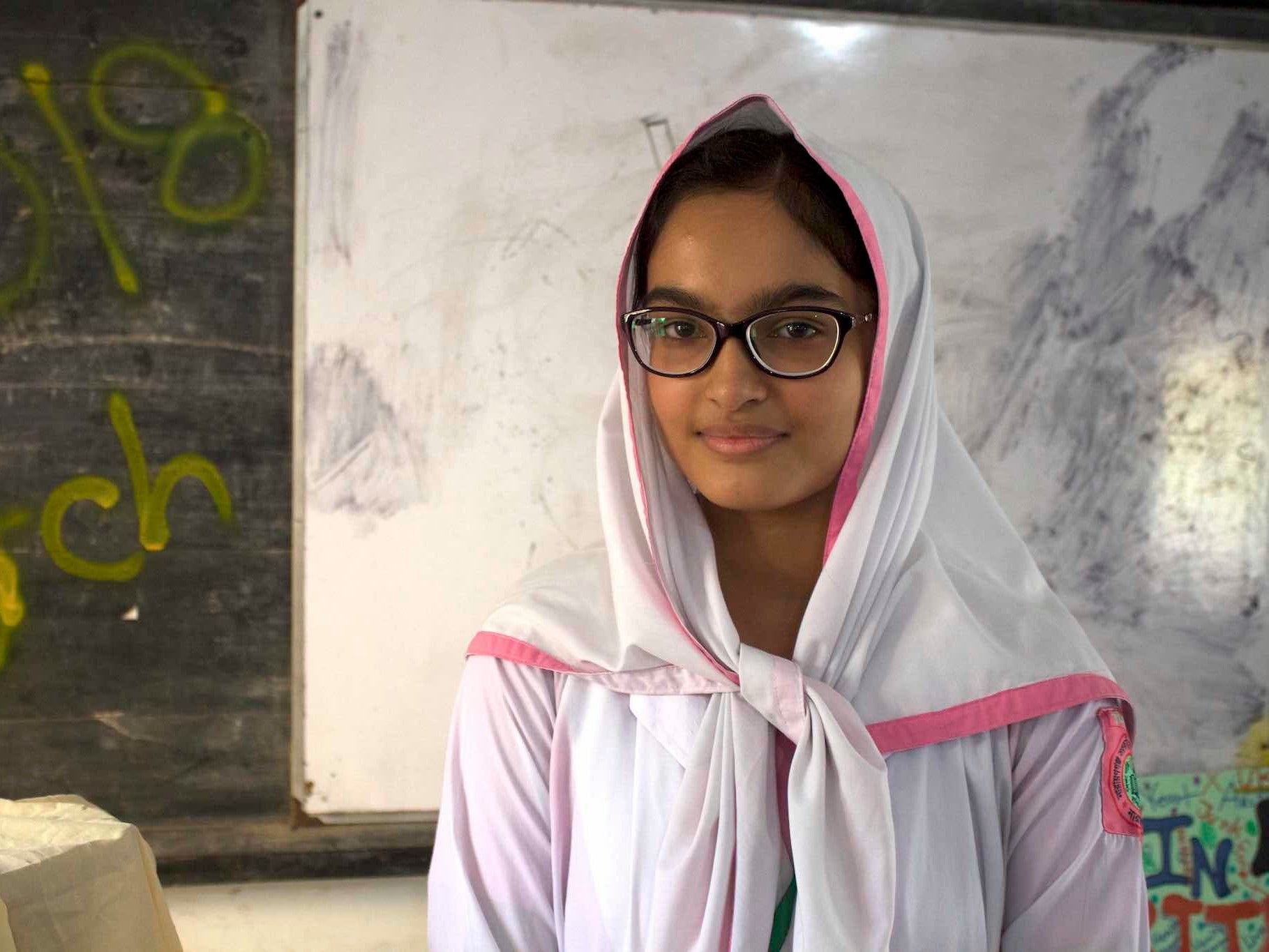‘If we think about our soul, we are all one’: Children in Bangladesh meet UK peers online
‘On the way to Bangladesh I saw people with their throats cut,' one Rohingya child recalls
Your support helps us to tell the story
From reproductive rights to climate change to Big Tech, The Independent is on the ground when the story is developing. Whether it's investigating the financials of Elon Musk's pro-Trump PAC or producing our latest documentary, 'The A Word', which shines a light on the American women fighting for reproductive rights, we know how important it is to parse out the facts from the messaging.
At such a critical moment in US history, we need reporters on the ground. Your donation allows us to keep sending journalists to speak to both sides of the story.
The Independent is trusted by Americans across the entire political spectrum. And unlike many other quality news outlets, we choose not to lock Americans out of our reporting and analysis with paywalls. We believe quality journalism should be available to everyone, paid for by those who can afford it.
Your support makes all the difference.Sadika and Hashim dream of becoming doctors when they are older. Both live in Bangladesh, benefiting from life-changing programmes supported by the UK taxpayer, and one day want to use what they are learning to help others in turn. But it is there that the similarities end.
Sadika is a bright 15-year-old girl living outside the capital Dhaka, attending a school twinned to a UK academy as part of the Connecting Classrooms programme backed by The Independent’s Learn to Live campaign, in partnership with War Child.
As part of the scheme, children like Sadika share classroom projects – as well as knowledge and cultural insights – with boys and girls of a similar age in Britain.
The Independent visited Sadika’s school in Bangladesh to see the extraordinary success of the scheme, and attend a class where students 8,000km apart were nonetheless sharing and learning together.
First though, we met Hashim, an 11-year-old Rohingya refugee, part of the exodus of more than 700,000 who fled persecution in Myanmar last summer. He may live in the same country and only 400km from Sadika in Cox’s Bazar, but he may as well be on another planet.
His voice is timid as he describes to The Independent how he came to Bangladesh, walking for days to reach the border and taking a boat across treacherous waters with his family of eight.
The violence he witnessed there makes him reluctant to talk about what life used to be like – but his face lights up when he describes his old home. “I really liked my house in Myanmar, it was much bigger than our house here. We had some cattle, we had farmlands, there was so much space to move around.”
Hashim is now among around 140,000 children who are receiving basic schooling in temporary learning centres run as part of Unicef’s education programmes – for which Britain’s Department for International Development (Dfid) is a major donor – in the sprawling camps outside Cox’s Bazar.
He learns English, Maths and the Burmese language, and says English is his favourite class because, if he studies it really well, “I can communicate with the whole world”.
But while the setting is safe and the teachers well-meaning, the classes here are very simple – repeating phrases from a textbook by rote, writing the alphabet on a board. The children will outgrow the lessons by the age of around 12, and there is no formal system of education for them to access in the camps beyond that age. In this context, it is hard to imagine how Hashim will realise his goal of becoming a doctor.
The children in Hashim’s class all agree that the couple of hours they get in the school are the highlight of their day, despite the limitations. But from monsoon rains to sickness and disease, the challenges of living in the world’s largest refugee camp constantly get in the way.
Foremost among these is hunger. “In Myanmar we had enough food for ourselves,” Hashim says, “but here we don’t have very much. When I’m hungry, my stomach churns, it hurts. I try to concentrate on my studies even if I am hungry, but I can’t enjoy it very much.”
For Sadika, school is a smart-looking complex of three-storey buildings, stretching in an L-shape around expansive grounds in the otherwise crowded city of Narayanganj, just south of the capital.

It caters to more than 1,200 girls in two shifts, morning and afternoon, and though the desks are worn and mould creeps out from the corners of humid classrooms, parents come from miles around to buy up increasingly pricey property in the school’s catchment area.
The school is one of the biggest success stories for Connecting Classrooms, which is run jointly by Dfid and the British Council.
Sadika’s Narayanganj Government Girls’ High School is twinned with Boston Spa Academy in Leeds, and during The Independent’s visit they share a lesson on “food adulteration”, learning how the food they eat can be laced with dangerous or unhealthy additives.
Because there is a sizeable time difference between the two countries, the girls in Bangladesh are played a set of pre-recorded videos of Boston Spa pupils describing their diet and its nutritional value.
A number of the Narayanganj girls then give impressive presentations – describing toxic powders cut with turmeric to make them appear more fresh, substances injected into mangoes to stop them going off – in English, some using PowerPoint to illustrate their findings. These are filmed by their teacher, Rashedul Kabir, to be sent to the class in Leeds.
“There is only so much we can get from a lecture in the classroom,” Sadika says. “We are learning so much more from this [Connecting Classrooms] programme. We learn about what is happening outside Bangladesh – now we know that in the UK they also have food adulteration, so it is a global problem.
“We are also learning about [the British students’] culture. There are a few differences – their classrooms are much cleaner, their culture is slightly different, their language is different.”
Sadika says the Leeds pupils’ accents were “sometimes difficult to understand” over the video messages, adding “but we did it!”.
“At the same time they are also like us,” she says. “If we think about our soul, we are all one. I would love to visit [outside Bangladesh] if I get the opportunity. The more we get to know them, the more we want to learn, and it inspires us to want to see them [in person].”
For now, the UK government has suspended exchange trips for teachers from Bangladesh to visit Britain, citing security issues, the British Council said.
Mr Kabir says he was lucky to have completed a number of trips to Boston Spa Academy before the ban came in, and emphasised the importance of sharing his experiences with others as part of the next phase of Connecting Classrooms.
The more we get to know them, the more we want to learn, and it inspires us to want to see them
As well as the UK visits, the British Council provided him with a training course in modern teaching methods and materials to use for the shared projects.
“If you visit other schools here [in Bangladesh], you will not find lessons like this,” he says. “Back in 2012 I too could not have given a class like this.
“The next stage is to share this knowledge, not only with other teachers at my school, but also with community schools. These are coming forward for support, and I am sending the list on to British Council.
“There are some schools in very rural areas that have brought revolutionary change since joining Connecting Classrooms. One has partnered with 12 schools (in Bangladesh and around the world), and the teacher has brought games and materials from all those schools. I have seen how it is making a huge difference.”

Nusrat Jahan, a project manager for the British Council’s schools programme in the country, says last year the Connecting Classrooms programme trained 1,100 teachers in Bangladesh alone.
“The next phase is about scaling up international cooperation between schools and expanding the programme to reach more children,” she says.
“The rate of literacy is low, and the country is still mostly dependent on agriculture. There are challenges with conservative parents not wanting to let girls go out for education, and families are generally happier if they have boys who can eventually help out with the farm work.
“But the situation is changing with education – and that’s where we can make a difference. The prime minister is a woman, there are more graduate jobs for women, as well as government schemes to boost education for girls. Together we are challenging the belief that only boys can help earn a living.”
The rate of literacy is low, and the country is still mostly dependent on agriculture
For now at least, educational improvements in Bangladesh as a whole are not reaching the refugees stuck in the Cox’s Bazar border camps.
Though the Bangladeshi government has been generous in offering safe haven to the fleeing Rohingya people, it ultimately wants to see them return to Myanmar and is resistant to any physical structures or institutions – like proper schools – that might make the camps seem more permanent.
The British Council is in talks with Unicef to support the English-language elements of UN teaching programmes for refugees, but the political situation means it is impossible to extend the benefits of Connecting Classrooms to the Rohingya.
Unicef itself is looking at ways to extend education to refugee children beyond the age of 12, and it does currently run some safe spaces for adolescents in the camps, where small groups of teenagers paint and relax while learning about issues of sexual consent, trafficking, forced marriage.
But the lack of formal further or higher education prospects for the more than half a million children living in the camp has led the UN, in a major report last month, to warn of an imminent “lost generation”, vulnerable to crime and radicalisation.

With the UN’s fund for the crisis barely half funded for 2018, it is hard to see a positive future for children like 11-year-old Asmaira, who fled Myanmar on foot after her whole village was uprooted by the violence last year.
“I was afraid,” she says. “The journey was very difficult. On the way to Bangladesh I saw people lying down with their throats cut, and I saw bullets hitting people.”
Asmaira says life is hard in the camp and that she would like to go back to her home in Myanmar but then pauses, and her eyes start to well up. “Our household is there, but the house itself was burned down,” she clarifies. Asked if she hopes her family can rebuild what they had, she nods.
Asmaira says she wants to be an English teacher when she gets older. “I want to keep studying here at the learning centre for as long as I can,” she says. “Even when it rains, we don’t have umbrellas and we get wet but still I come. If I am going to become a teacher, it is important for me to keep learning.”

Join our commenting forum
Join thought-provoking conversations, follow other Independent readers and see their replies
Comments